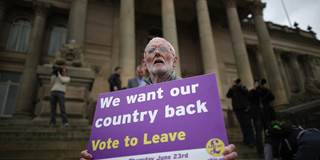It is now all but certain that Britain will leave the EU in March 2019 without a workable divorce settlement. The only question is whether this outcome will be the economic catastrophe that most observers fear.
LONDON – Since June 23, 2016, when 52% of British voters backed withdrawing from the European Union, the “Brexit” debate has been tearing British politics apart. Although the Brexit referendum was non-binding, then-Prime Minister David Cameron’s government, expecting a vote in favor of “Remain,” had promised to honor the result. Britain, late to join the EU, will be the first member state to leave it, with the exit date set for March 2019.
Remainers alternate between blaming Cameron for his recklessness in holding the referendum and his incompetence in managing it, and castigating the Brexiteers for swamping the voters with lies. At a deeper level, the Brexit vote can be seen as part of a transatlantic peasants’ revolt, making itself felt in France, Hungary, Italy, Poland, Austria, and of course the United States. Both explanations have merit, but both ignore the specifically British roots of Brexit.
Britain had stood alone against a Hitler-dominated continental Europe in 1940, the moment of recent history recalled with most pride. Years later, Margaret Thatcher voiced a common British sentiment in her usual emphatic manner. “You see,” she once said to me, “we visit, and they’re there.” Despite former Prime Minister Tony Blair’s stated intention, Britain was never “at the heart” of Europe: it was. In their 42 years in the EU, the British have always been an awkward, Euroskeptical partner. Approval of membership has only briefly been above 50%, and by 2010 was dipping below 30%. A referendum back then most likely would have resulted in an even bigger majority for leaving.

LONDON – Since June 23, 2016, when 52% of British voters backed withdrawing from the European Union, the “Brexit” debate has been tearing British politics apart. Although the Brexit referendum was non-binding, then-Prime Minister David Cameron’s government, expecting a vote in favor of “Remain,” had promised to honor the result. Britain, late to join the EU, will be the first member state to leave it, with the exit date set for March 2019.
Remainers alternate between blaming Cameron for his recklessness in holding the referendum and his incompetence in managing it, and castigating the Brexiteers for swamping the voters with lies. At a deeper level, the Brexit vote can be seen as part of a transatlantic peasants’ revolt, making itself felt in France, Hungary, Italy, Poland, Austria, and of course the United States. Both explanations have merit, but both ignore the specifically British roots of Brexit.
Britain had stood alone against a Hitler-dominated continental Europe in 1940, the moment of recent history recalled with most pride. Years later, Margaret Thatcher voiced a common British sentiment in her usual emphatic manner. “You see,” she once said to me, “we visit, and they’re there.” Despite former Prime Minister Tony Blair’s stated intention, Britain was never “at the heart” of Europe: it was. In their 42 years in the EU, the British have always been an awkward, Euroskeptical partner. Approval of membership has only briefly been above 50%, and by 2010 was dipping below 30%. A referendum back then most likely would have resulted in an even bigger majority for leaving.